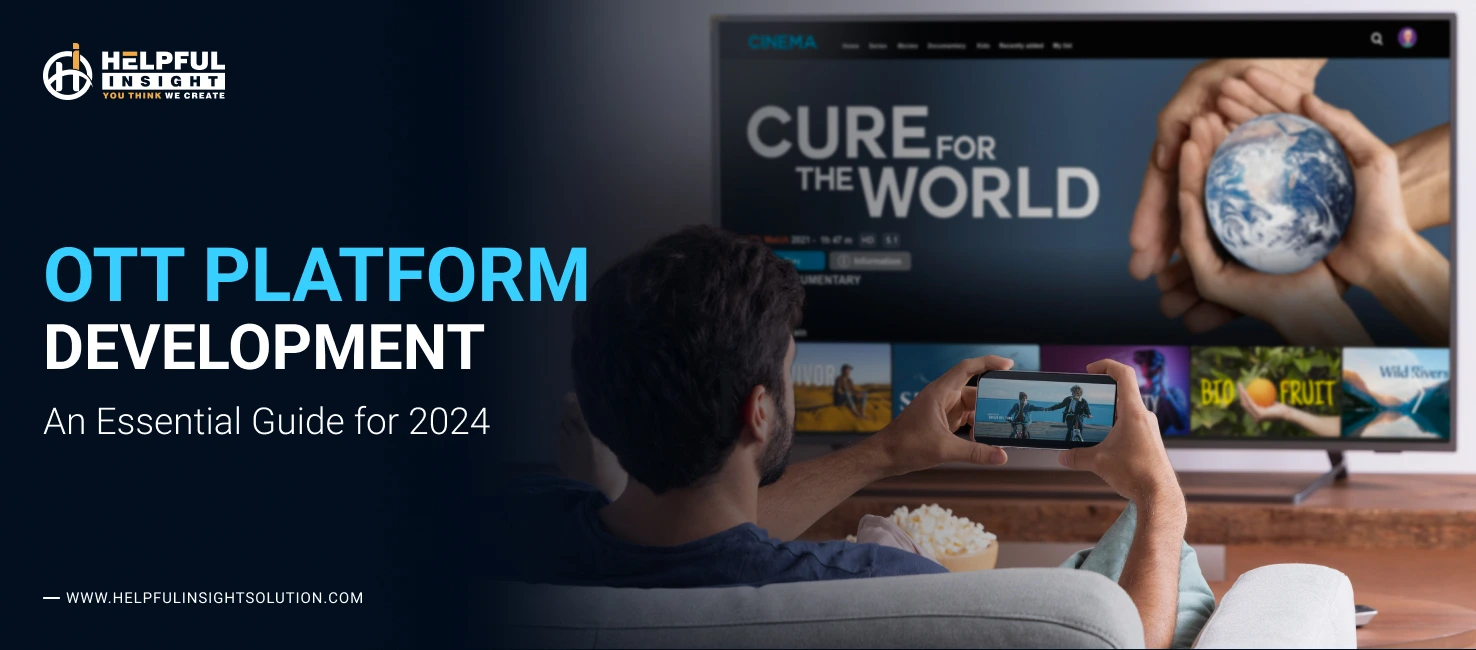In the digital age, Over-the-Top (OTT) platforms are changing how we watch content, thus evolving a new entertainment system. These mediums offer an expansive collection of audio, video, and other types of content through the Internet, cutting out traditional routes like cable or satellite television. The massive growth of OTT platforms marks a paradigm change in the entertainment industry by providing users with unrivaled flexibility, range, and choice.
OTT platform development requires a sophisticated collaboration of streaming technology, content production, and user experience design. From developing a scalable infrastructure for content delivery to implementing content delivery mechanisms that ensure smooth playback as well as high user engagement across different devices and networks, developers encounter several challenges.
On the other hand, with the emergence of new technologies like artificial intelligence, machine learning, and data analytics, OTT providers keep improving their solutions to enable personalized recommendations, targeted ads, and interactive features, in the end, improving the user experience.
This blog is about the emerging technology of OTT platform development, we also can say live Streaming application development where we uncover the latest trends, tried and proven techniques, and groundbreaking ideas in this sector of digital entertainment. Venture with us on this trip as we take the complexities of creating and optimizing OTT platforms in a world of dynamic media consumption.
OTT app development market: Current State and Trends
The OTT (Over-the-Top) market apps are growing at a steady pace and bringing in a lot of innovation due to changing consumer preferences, advances in technology, and shifting market dynamics.
Current State:
- Rapid Growth: Rapid development of the OTT app market is being driven by the growth of internet penetration, the sharp rise in the number of smartphones, and the demand for on-demand content consumption worldwide.
- Market Expansion: OTT platforms are reaching out to different regions and demographics painting a people-centric world and offering customized regional content with local languages.
- Content Diversity: OTT platforms deliver various genres of content including movies, TV shows, original series, documentaries, sports, and live events available to consumers that fit their tastes and preferences.
- Technological Advancements: The progress in streaming technology including HD and 4K video streaming, adaptive bitrate, and cloud-based infrastructure improve the quality and believe that OTT services work flawlessly on many devices.
Trends:
- Original Content Production: OTT platforms are spending a lot of money in creating original content to distinguish themselves from one another and get more subscribers. Original series and movies keep users hooked and attracted, create brand adherence, and give the brand a competitive edge.
- Global Expansion: OTTs are going for new market entry strategies, partnerships with local content providers, and localization of content for international audience captivity.
- Personalization and Recommendation: OTT services adopt AI and ML algorithms which enable them to offer personalized recommendations, content suggestions, and user experiences facilitating engagement and retention.
- Monetization strategies: OTT providers are going beyond the subscription-based model in their monetization efforts by seeking innovative strategies such as ad-supported content, Pay-per-view rentals, in-app purchases, or their hybrid model which combines subscription and advertising revenue streams.
- Live Streaming and Interactivity: Live streaming of sports events, concerts, gaming competitions, and interactive content formats is popular but it brings some beneficial features such as the ability to provide a real-time experience and community involvement.
Types of OTT platforms
The Content delivery network (CDN) has branched out into different types that cater to different tastes and preferences of content and consumption behaviours which has resulted in the emergence of different kinds of OTT platforms. Here are some common types:
Subscription Video-on-Demand (SVOD):
The SVOD services provide An on-demand subscription model for accessing a huge database of content available in the library, comprising movies, television shows, and original content. Users pay subscription Charges for unlimited streaming and apps like Hotstar charge 1499RS yearly for the premium plan.
Advertising-supported Video-on-Demand (AVOD):
Ad-supported video-on-demand (AVOD) platforms offer free access to video by displaying advertisements. Users can watch videos without spending money but they may get adverts while the video is playing. Examples include YouTube and Pluto TV.
Transactional Video-on-Demand (TVOD):
TVOD platforms provide users with the option of paying a one-time fee to rent or download a video title. Users can get and use the content only for some time after the payment of the amount. Examples include iTunes and Google Play Movies & TV.
Live Streaming Platforms:
Live-streaming media mainly specializes in the transmission of live video content, like sports games, concerts, gaming, and news. Among them, we can name such as Facebook and YouTube Live.
Specialized Content Platforms:
These platforms issue special content genres or areas of interest and look forward to including a Content management system (CMS) for reaching out to specific audiences such as Crunchyroll (anime) and Curiosity Stream (documentaries).
Hybrid Models:
Other online video platforms adopt hybrid models that involve the combination of the elements of SVOD, AVOD, and TVOD that produce various monetization possibilities. Examples are Hulu the subscription and also the ad-supported tier.
Must-have features for your OTT platform
Creating a successful OTT (Over-the-Top) platform requires incorporating essential features to enhance User interface (UI) design, engagement, and monetization opportunities:
- Intuitive User Interface (UI): Usability and design that characterize a user-friendly interface, easy navigation, visually appealing design, and simplicity of the controls contribute to preserving the engagement of users to your platform.
- Content Discovery and Recommendation Engine: Establish a highly efficient content discovery engine that runs on advanced AI and machine learning algorithms or works with Analytics and user insights and brings suggestions as per preference, history, and behavior of the user.
- Multi-Device Compatibility: Offer compatibility games he can play on various devices, including smartphones, tablets, smart TVs, and gaming consoles, and watch shows and movies anytime and anywhere. Should provide User authentication and authorization.
- High-Quality Video Streaming: Enable HD and 4K video streaming services so that users get superior viewing quality and adaptive bitrate streaming that will optimize video quality based on the bandwidth.
- Offline Viewing: Give users the privilege to access the download option for offline viewing when the connection fails, which can be of great importance to travelers or data-plan subscribers with low internet connectivity.
- Monetization Options: Incorporate various income generation models that include subscription-based services, advertising-supported content, pay-per-view rentals, in-app purchases, and premium memberships to maximize earnings and give different user tastes options.
- Live Streaming and DVR Functionality: Integrate live streaming features for the live broadcasting of events, sports competitions, news, and live shows accompanied by DVR functionality to make it possible for the users to pause, rewind, or even record live content for viewing at a later moment.
- Social Sharing and Community Engagement: Social media integration in features that allow users to share their most liked content on social media platforms and community engagement features like comments, likes, and user reviews to create a community where users interact with each other.
- Content Management System (CMS): Utilize a robust CMS to efficiently manage and organize content, including metadata, thumbnails, trailers, and captions, ensuring seamless content delivery and updates.
Security and Digital Rights Management (DRM): Ensure robust security measures to protect against, unauthorized access, and content theft, including digital rights management (DRM) solutions and Content licensing and rights management to safeguard copyrighted content and prevent illegal distribution.
Develop a powerful platform to stream your content effortlessly.
How to build an OTT video streaming app?
Building an OTT video streaming app involves several key steps: Building an OTT video streaming app involves several key steps:
- Market Research: Identify the needs of your target audience, competitor dynamics, and trends to spot opportunities and challenges.
- Define Features: Establish your app’s main features, such as user authentication, content discovery, search, video playback, Video encoding and transcoding, and payment processing.
- Choose Technology Stack: Choose proper frontend, backend technologies and tools that suit your project (React Native, Flutter), backend (Node.js, Laravel), cloud infrastructure (AWS, Google Cloud), and CDN delivery. Hire React Native developers for your next OTT application development
- Design UI/UX: Develop an interface that is quick and pleasing to use so users can easily navigate and have a nice watching experience, or Push notifications and alerts on all types of gadgets.
- Develop: Build the frontend, and backend as well as APIs aligning to Payment gateway integration, scalability, performance, and security. Building on top of other services by integrating payment processing and analytics will help to deliver a better user experience.
- Content Acquisition: Ensuring to sign secure licensing deals or produce original content for your website will do. Set up and retrieve content according to genres, languages, and user preferences.
- Testing: Carry out the performance tests to locate and fix bugs, ensure compatibility with devices and platforms, and increase speed.
- Launch: Distribute the app to app stores (e.g., Apple app store, Google Play store) then market it through marketing campaigns and Scalability and performance optimization to have users try the product and get feedback from them.
- Iterate: Regularly ascertain user feedback, observe app performance, and update the app with new features and improvements to add to the user experience and increase engagement.
How much does custom OTT app development cost?
The cost of creating a custom OTT platform fluctuates by the complexity of features, the technology stack employed, development time, and team involvement. For the most part, an OTT development platform can range from $50,000 to $500,000 or more.
Key cost factors include:
- Feature Set: With the simple combination of standard capabilities of OTT platforms like user authentication, content delivery, and video playback, these solutions will have lower development costs. In addition, platforms with sophisticated features like recommendation engines, live streaming, offline viewing, and social integration necessitate more resources to operate them and result in higher costs of operation.
- Technology Stack: The choice of backend and frontend technologies, cloud infrastructure, and other third-party integrations influences the total budget for development. One advantage of choosing established frameworks and platforms is that they are likely to be ready to use to a large extent, thus cutting down development time and costs.
- Content Acquisition: The acquisition of movie or TV show content, as well as ad-hoc development of original programming, can be also pretty expensive and should be included as the cost factor while planning the building of an OTT platform.
- Development Team: The size and the skills of the development team such as the project managers, designers, Javascript programmers, programmer – Backend programming, QA team, and DevOps team determine the development cost. Hiring professionals with high experience levels may come with a higher hourly rate but may also bring better-quality results.
- Testing and Maintenance: In addition, budgeting should also allow for the expenses related to the testing, quality assurance, and ongoing maintenance or support.
Strategies for making money on an OTT platform
Monetizing an OTT (Over-the-Top) platform involves implementing various strategies to generate revenue while providing value to users. Here are some effective strategies for making money on an OTT platform:
- Subscription-Based Model: Provide subscription packages with different pricing plans, allowing users to access premium content, without ads, offline downloads, and other additional facilities. Permanently update and expand content options that can boost subscription renewals and attract more subscribers.
- Advertising Revenue: Introduce advertising into your OTT platform by cooperating with advertisers and showing relevant ads before/during/after video content. Develop ad-driven tiers that would allow limited access to content for free-viewing users, and premium ad-free subscriptions for those willing to pay.
- Pay-Per-View and Rentals: Allow users to rent or buy individual titles or access premium content on a PPV basis with live pay-per-view transactions i.e subscription management. Propose rental of new movies, live events, and exclusive content for a transactional fee, giving a chance to users to pay for content as needed.
- Sponsorship and Product Placement: Partner with brands and sponsors to add product placement, branded content, and sponsored promotions to your platform. Develop ways for advertisers to reach their targeted – audiences through integrated marketing campaigns and partnerships with sponsored content.
- Merchandising and E-Commerce: To add revenue streams, and sell merchandise, digital downloads, and products related to your OTT platform. Leverage e-commerce functionality to provide special merchandise, collectibles, and digital assets linked to the most popular content assets.
- Partnerships and Licensing: Forge teams up with content producers, production studios, and distributors to license and distribute 3rd party content on your OTT network. Work out revenue-share arrangements and licensing fees to capitalize on content and grow your content library.
- Data Monetization: Utilize consumer data and analytics information for targeted advertising, personalized suggestions, and pay packages that meet the needs of the consumers. Adhere to privacy regulations and be transparent with the users about the collection and usage practice of data.
Tailored app development for all your streaming needs.
Why Choose Helpful Insight as Your OTT Development Service Partner?
Choosing Helpful Insight for OTT app development offers numerous advantages due to our expertise, commitment to quality, and customer-centric approach.
- Extensive Experience: Having extensive years in software development, we are diversified in OTT app development and we can use the experience and knowledge that we have acquired to help our clients solve their problems. Our team can boast of having completed several projects, where our products are consistently of top-notch quality, meeting client specifications.
- Specialized Skills: Our team of developers, designers, and project managers who have specialized skills in building OTT apps for years is very dedicated. Our team continues to keep up the pace with the changing trends, adoption of new technologies, and the implementation of the latest best practices thus providing state-of-the-art solutions to our customers.
- Customized Solutions: We know at Helpful Insight that every project is different, and therefore each solution is tailored to the needs and objectives of the particular customer. Whether you need to apply a subscription, Live streaming, or personalized recommendations, we can create an OTT custom app that fits your needs.
- Focus on Quality: Quality is the number one priority in our organization, Helpful Insight. We follow rigorous industry standards and best practices throughout the development process to guarantee that our products are highly robust, scalable, and user-friendly.
- Transparent Communication: We are keen on open discussions and joint work between our clients and us. We keep the communication lines open, provide Scheduled reports, and welcome client feedback at every stage of the task.
- Timely Delivery: Our team is dedicated to meeting the timelines and delineation of projects. We achieve our project goals by following a streamlined development process and adhering to our efficient project management practices, while still maintaining quality.
Want to know more about OTT or have some questions related to developing the best OTT app in India, the US, and the UK? Get in touch now!





